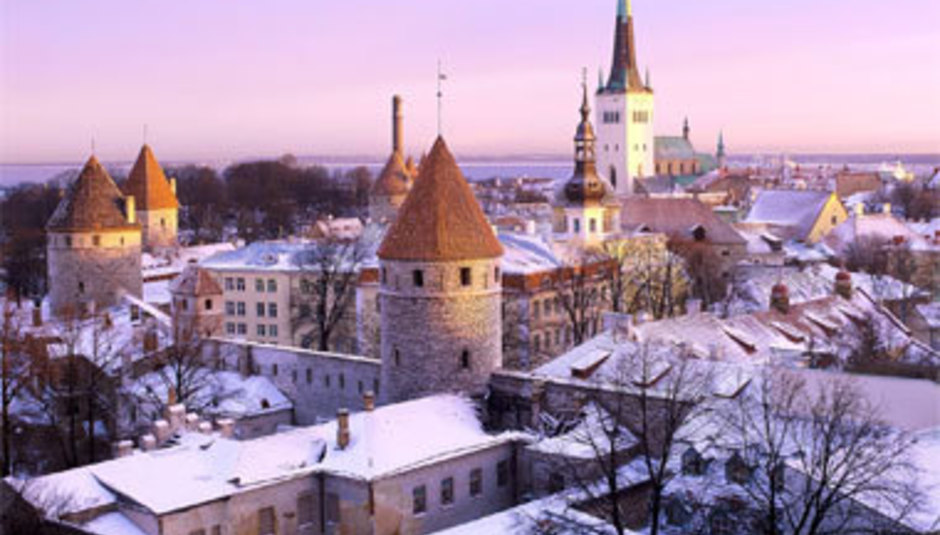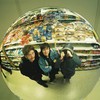Living in the UK it’s all too easy to forget that beyond our shores lie musical scenes untapped; heck, live in London and you sometimes forget gigs actually take place outside the capital. It’s with this in mind DiS touches down in the Baltic States’ northernmost frontier, where volunteers from the inaugural Tallinn Music Week shepherd us to the hotel. –8° C? Totally worth it.
As the music (that’s 65 bands spread over ten stages) doesn’t begin until the evening, daytime is divided between the numerous conferences taking place at the Nordic Hotel Forum (which alongside the likes of MTV and Estonia’s own Skype partners this endeavour). The seminars themselves are made up of panels comprising several key figures of the European music scene – whether those in the charge of heading up their respective countries’ Music Export programmes, international booking agents, festival directors or label bosses. The series ranges from earnestly grappling with that biggest of questions currently facing the industry (“should music be available for free…?”) through to the means by which breaking and established acts can be toured and promoted, and provokes fascinating dialogue between those in attendance.
Come early evening we’re whisked outside the city, where Estonian cuisine is sampled and conifer-strewn icy paths negotiated, before being shuttled back to the opening of venue doors. Think of it as a kind of Camden Crawl, if you like – albeit one where dank, urine-pervaded venues can be substituted for charming basement clubs and blacked-out boozers for opulent theatres – all in the surrounds of a beautiful, cobblestone old city.
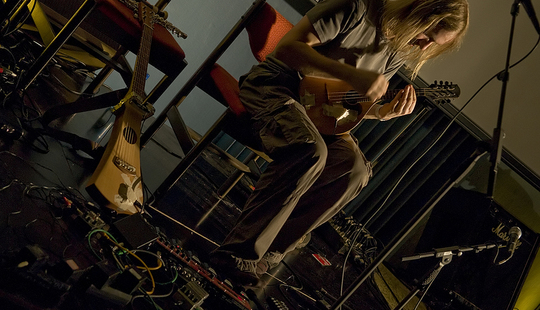
Though DiS fails to make it in time to see Chungin & The Strap-On Faggots (perhaps for the best), a street over the intimate Mustpeade Maja hall plays host to the delightful stylings of one Ramo Teder, a.k.a. Pastacas. Armed with recorders, mandolins, guitars, recorders, flutes – and most significantly, a colossal array of pedals and looping equipment – Teder crafts swirling organic soundscapes that, to watch in this chilly city, evoke a sense of grandeur as elemental as it is deft. Residing yonder the Baltic Sea in Finland, it’s entirely within reason to suggest those choppy waters and the bracing wilderness of this region have impressed themselves into his recordings, of which he’s now amassed a fair back catalogue.
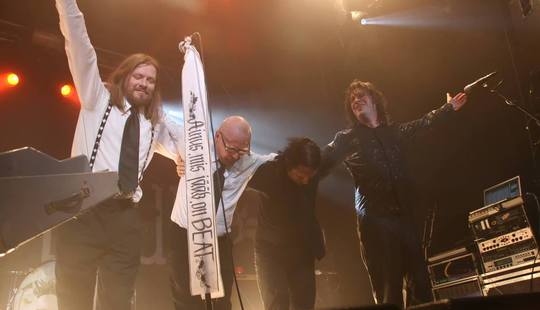
Next up is something a little more raucous, as DiS hightails it to Tallinn Music Week epicentre the Von Krahl. Here Estonian institution Kosmikud are positively owning the stage, churning out a delightfully sleazy, sludgy take on rock’n’roll. Meelis ‘Hainz’ Hainsoo leads the snappily dressed quartet through an invigorating, rapturously received set (where pretty dancing girls outnumber sweaty heaving dudes almost two-to-one), variously recalling the rumbling groove of golden-era Queens Of The Stone Age and the theatrical bent of AC/DC. Christ knows what they’re shrieking about, but it gets this fist pumping. Towards the end of the set guitarist Aleksander Vana sweeps Hainz into his arms for a kiss, gleefully subverting any machismo traits they might be associated with. Righteous.
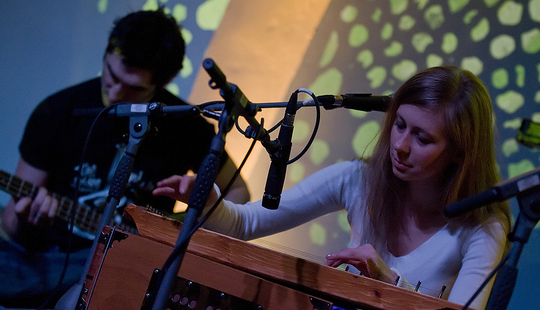
Now, despite being recommended them plenty and even currently occupying the very venue in which they’ll shortly emerge, I manage to miss acclaimed local trio Aides (ahem: ‘eye-dez’), and instead find myself elsewhere and enraptured by the hypnotic strains of another three-piece, Kirtana Rasa. Theirs is a slow-burning fusion of styles influenced by numerous years spent travelling – an approximation of languages, cultures and traditions that impacts initially as a result of Kaushalya and Kadi Uibo’s mellifluous tones. Anything but interminable hippie drones, African and Eastern flavours permeate their harmonium and djembe-led set, its highlight a delicate, restrained number sung in French.
It’s something of a shock, then, to wander back to the Von Krahl only to be faced with an act as abundantly abrasive as Pedigree, who pride themselves on a sense of “pure sonic torment.” 15 years in the game is a long time for any band, but it certainly hasn’t mellowed this quartet any. Credited with pioneering the advent and acceptance of industrial music in Estonia, they throw themselves into their performance as if it’s the last they’ll ever play. “Love! Fear! Religion! Paranoia!” vocalist Holden Laamann hollers at his audience over a crunching metallic backdrop and schizophrenic visuals. Quite.
The next day finds DiS nursing a sore head and quickly aborting a sightseeing jaunt ‘round the city only to crank the room temperature, succumb to the softest of beds and shamefully doze through the afternoon while dreaming of the snowy outside. Come the evening, Tiit Kikas is the first point of call, an electric violin player of a cleverly titled album (String Theory) and oblique, jarring style. It’s impressive, looped, layered and distressed stuff, though not the easiest of listens, so it’s a relief when Cloudspeak take to the stage with an accomplished set of frosty, ethereal pop. Fronted by Kadi Uibo of yesterday’s Kirstana Rasa, it’s wholly pleasant if slightly transient in nature – songs unfurling gradually rather blossoming entirely. Nevertheless: an intimation of better things to come.
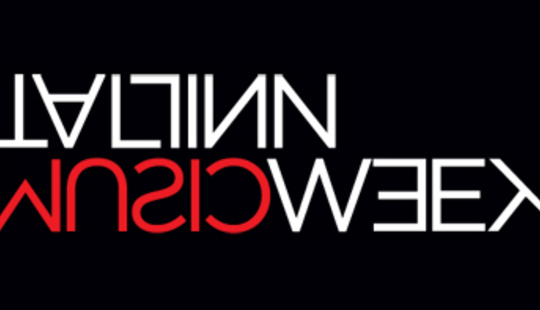
Next, we hotfoot it to the stately No. 99 Theatre with the intention of catching mandolin-warriors Gjangsta, though in what will prove a recurring theme of the evening, instead get hopelessly lost and arrive only to see them packing up. This does, however, culminate in impromptu exposure to The Best Of Nordic Sounds, which sees an improvisation-minded pair (Villu Veski and Tiit Kalluste on sax and accordion respectively) receive backing from an assemblage of Estonian talent, in a jazz-based set encompassing Scandinavian folk, Nordic heritage and even some Latin-inflected numbers. It’s a pleasure to behold; consummate musicianship and imaginative solos perpetuating the notion that the Baltic and Scandinavian regions really do shine in terms of the jazz performers they offer.
Downstairs, Bullfrog Brown fail to convince in quite the same manner, the bluesy duo patently in thrall to their influences and of overly gracious onstage personae. The dedication singer Alar Kriisa brings to the table elevates them far above the slavish mind, and however affected it may be, it remains a diverting and enjoyable show.
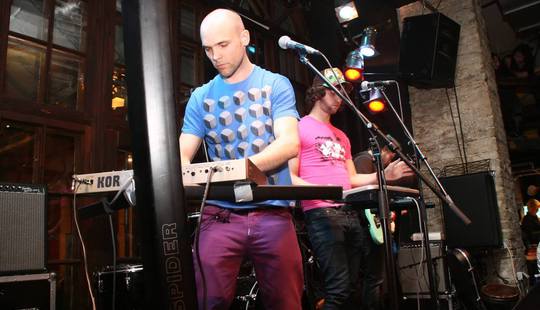
Final destination for the evening is Club Hollywood. About as far-removed from the stately No. 99 or homely Von Krahl as you can get (think J.D. Wetherspoon’s vs. The Fat Duck), we arrive to the electro-pop stylings of Popidiot. All neon-rave and clipped synth, they defiantly mine the same fields as Hot Chip, Cut Copy and the like, the spectre of The Human League looming particularly strong. Of course, this is far from a bad thing, and while first impressions suggest they’d benefit from some better-defined tunes to hang around their propulsive backbeats, it remains frantically enjoyable stuff. They even have a song called ‘Dance Like An Idiot’: props.
Lithuanian outfit Happyendless round off the weekend with requisite style, perhaps baffling the young crowd who just got their rocks off to Popidiot with their intricate rock songs, but ultimately proving no less dance-able. A curious blend of sleek-pop influences, Saulius Prusaitis forms the band’s likeable and impassioned centre, around which their technically adroit racket revolves.
And with that, the weekend is all but done in terms of live music, and DiS returns once more to the Nordic Hotel Forum where, unbeknownst to him at this point, a day that will shake his faith in British Public Transport to its very foundations awaits.
For now though, it’s been a weekend of fine music in an arresting and friendly locale. Immaculately organised and well considered, being present at the very first Tallinn Music Week feels how it might have felt to those attending the first by:Larm festival conference in Norway some eleven years ago. There’s a diverse and vibrant scene here, and enough people with the passion and drive to really make something of it.
Basically, consider any memory of this you might hold well and truly vanquished.
Three more to investigate:
Röövel Ööbik
Formed way back in 1987 (when they formed an allegiance with then-fledgling, now renowned Finnish label Stupido), this lot probably get tired of being billed “John Peel’s favourite Estonian indie band.” But, to give them their dues, they were John Peel’s favourite Estonian indie band.
MySpace.com/RöövelÖöbik
Ans. Andur
Referencing greats such as R.E.M., the Beach Boys and Yo La Tengo, this quartet trade in sunny melodies and dreamy fuzz-pop.
MySpace.com/AnsAndur
Milla
Screeching, uncompromising, nightmarish sheets of white noise. Terrifying.
MySpace.com/MillaEst
Photography by Hanna Lehari & Mats 6un. Special thanks to Helen Sildna & the organisers.

